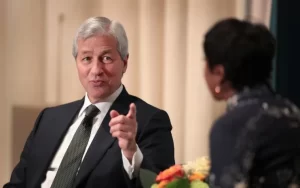Jamie Dimon, chief executive of JP Morgan Chase, has warned that the United States faces a 50 per cent chance of recession, citing the fallout from President Trump’s sweeping trade tariffs and a growing mix of economic headwinds.
Speaking as markets continue to reel from the uncertainty triggered by the new tariff regime, Dimon said the world’s largest economy faces “considerable turbulence”. He pointed to stubborn inflation, high fiscal deficits, elevated asset prices and continued market volatility as compounding the risks.
“As always, we hope for the best but prepare the firm for a wide range of scenarios,” Dimon said, underlining his concern about the direction of the US economy.
His comments came as John Williams, head of the Federal Reserve Bank of New York, also warned that the new tariffs could drive US inflation up to 4 per cent this year, pushing unemployment higher and cutting economic growth in 2025 to below 1 per cent.
Dimon said he had already observed major companies pulling back on hiring, delaying mergers and acquisitions, and preparing to withdraw forward earnings guidance as the full impact of Trump’s tariff policy remains unclear.
JP Morgan itself raised its provision for bad debts to $3.3 billion for the first quarter — up from $1.9 billion a year earlier — as part of its efforts to hedge against growing economic uncertainty.
In response to internal speculation, Dimon rejected the suggestion that analysts at JP Morgan were being pressured to tone down their views on the consequences of the trade war. The comments followed a note by Michael Cembalest, chair of market and investment strategy, who said he had to consider how his analysis might be interpreted internally and externally in the current political climate.
Dimon responded: “Our analysts are expected to speak their mind freely.”
President Trump himself appeared to take note of Dimon’s caution. The banking boss had previously said a recession was a “likely outcome” of the ongoing trade war — a comment Trump reportedly referenced when announcing a 90-day pause on tariffs for most countries earlier this week.
Larry Fink, chairman and CEO of BlackRock, also struck a sombre tone, saying the prevailing market turmoil was dominating client conversations and impacting retirement savings for millions. BlackRock reported net inflows of $84.2 billion, below analyst expectations, and a 4 per cent decline in net profit to $1.5 billion, attributed in part to acquisition-related costs.
Still, the recent market volatility has proved a windfall for trading desks. JP Morgan reported a 19 per cent rise in trading revenue, with equities jumping 48 per cent, while Morgan Stanley posted a 45 per cent surge in equity trading revenue, pushing total net revenue to $8.9 billion for the first quarter.
Despite this, Ted Pick, chairman and CEO of Morgan Stanley, warned that the long-term implications of Trump’s trade policies remain uncertain.
“The simple truth today is that we do not yet know where trade policy will settle, nor do we know what the actual transmission effects will be on the real economy,” he said.
As America’s financial giants brace for the economic consequences of shifting trade dynamics, businesses and investors alike are preparing for a period of prolonged uncertainty — with recession now a very real possibility.

